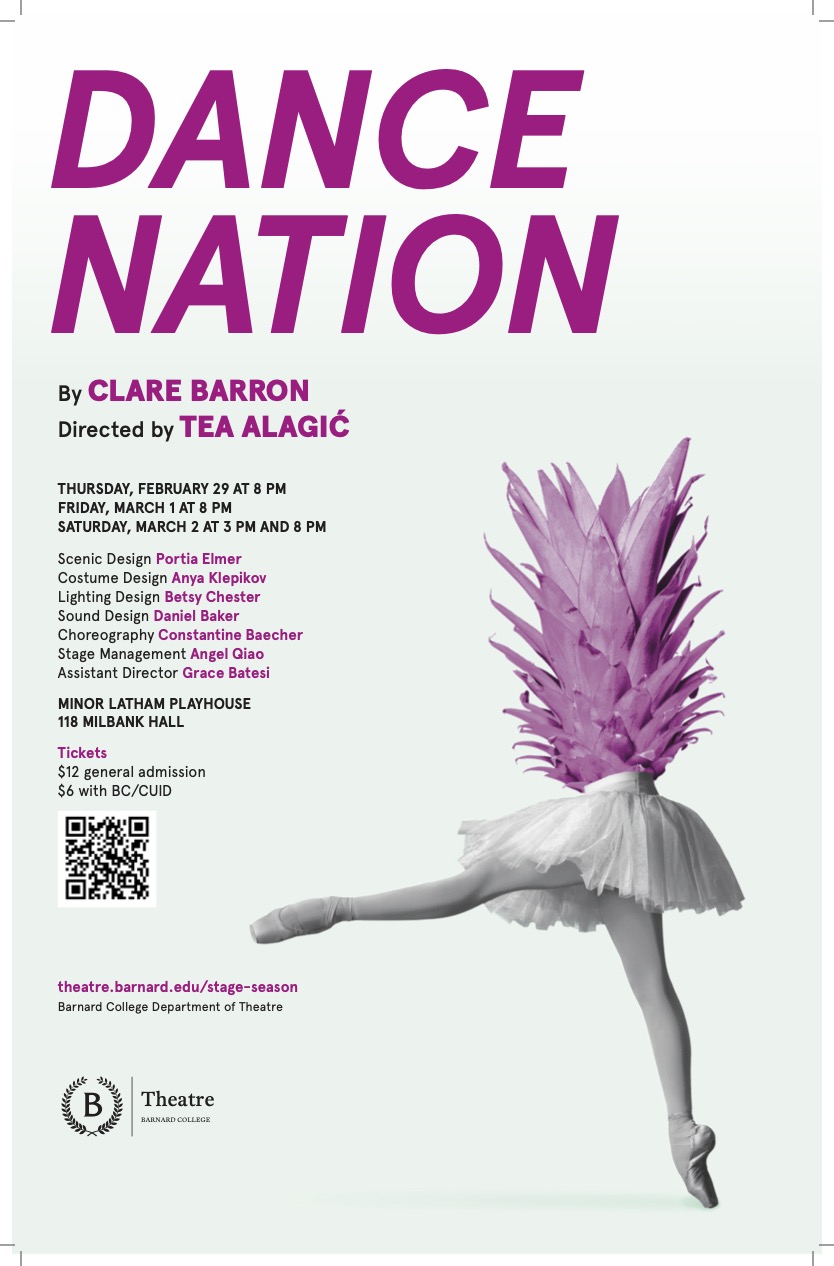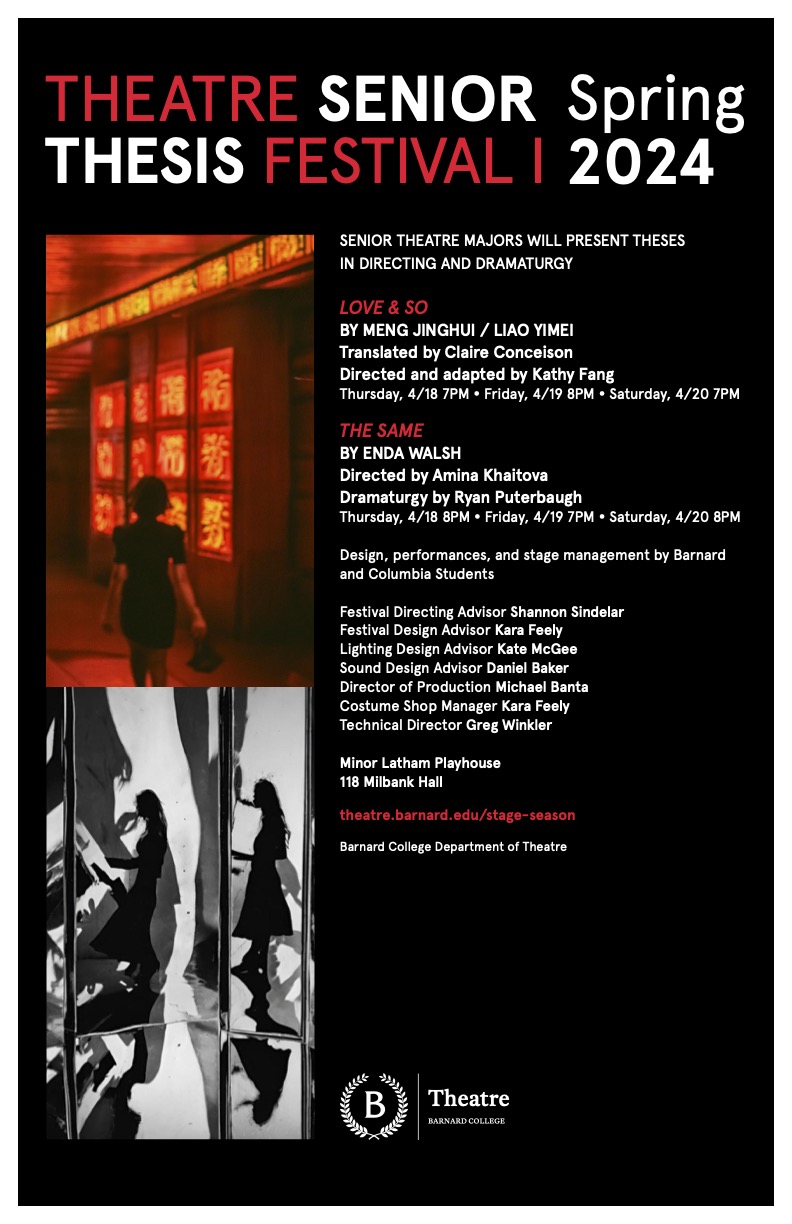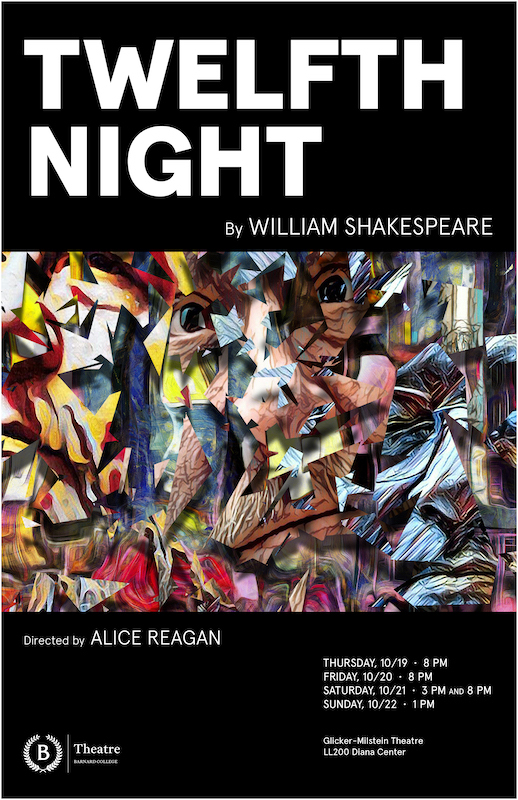Stage Season 2023-2024
Spring 2024

Dance Nation
by Claire Barron
Directed by Tea Alagić
February 29-March 2
Director's Statement
I love the language of the play. It is unapologetic and surreal. The play is a mix between being old and being a teenager. It deals with sexuality and bodies and the way we look at our bodies and the way others look at our bodies. It's a world of dance with a lot of female voices and competition between each other but also camaraderie and support. I'm interested in the character of Zuzu because in the play she says “this is my last day of dance on earth!” and she frees herself from the world that is very rigid and somewhat traditional. I love this play because it is fearless and allows female characters to own who they are and be vocal about it.
Tickets

Senior Thesis Festival
April 18-20, 2024
Love & So
by Meng Jinghui / Liao Yimei
Translated by Claire Conceison
Directed and adapted by Kathy Fang
At the turn of the 21st century, a rhinoceros dances in the heat, alone. Her keeper is in love with his next door neighbor. They love, and so there was light.
Love & So collages two of Chinese director Meng Jinghui’s plays: Rhinoceros in Love, a play composed and developed with playwright Liao Yimei, and I Love XXX, devised two decades after the Chinese Cultural Revolution. In addition to the two plays’ shared interest in love—and all the things we do in the name of love—both Rhinoceros and I Love XXX ask us to feel language differently, in strange new terms of movement and drama. Love & So is an invitation to step into a language of speaking, of moving, of loving that is not quite our own. Learning to speak together, we reach towards an ethics of translation as empathy, as intimacy, as love and as play.
Thursday, April 18, 7 PM - GET TICKETS
Friday, April 19, 8 PM - GET TICKETS
Saturday, April 20, 7 PM - GET TICKETS
The Same
by Enda Walsh
Directed by Amina Khaitova
Dramaturgy by Ryan Puterbaugh
To live a life already lived…
The Same tells a story of two versions of the same woman named Lisa. It is essentially a memory play in which the timelines get intertwined, the past version becomes the future and the future leaves its mark on the past. At the core of the play is the internal world – the psyche of two Lisas – where the personal memories are told through a reenactment of circumstances that fundamentally shaped Lisa’s personality. In a world where the internal becomes the external, the physicalized and visual realities serve as stimuli not only for Lisa’s mind but also for the audience’s as an encouragement to build your own “truth” of the story. Prepare to dive into the unknown, strange, dangerous world of two Lisas where nothing is as it seems, and everything is not quite right.
Thursday, April 18, 8 PM - GET TICKETS
Friday, April 19, 7 PM - GET TICKETS
Saturday, April 20, 8 PM - GET TICKETS
Senior Thesis Festival - Weekend II
Research, Solo Performance, and Playwriting
April 26 & 27, 2024
FRIDAY, APRIL 26, 2024:
3:30 PM | RESEARCH PRESENTATIONS – TICKETS
"Flowers for Elizabeth Barry: The Adaptation of Women to English Restoration Performance" by Caroline Egler
"Reclaiming Authenticity: The Evolution of the Black Body in Performance and Media" by Timi Odunjo
"'Do You Remember Me?': Trans Perception, Performance and Legacy" by Kristofer Thomas
6 PM | SOLO PERFORMANCES – TICKETS
“At The Bottom Of Our Garden" by Eleanor Babwin
"Shut Out" by Gabrielle DuBrul
7 PM | RECEPTION FOR GRADUATING SENIORS
All seniors in the theatre major are encouraged to attend a reception celebrating the culmination of the thesis process!
SATURDAY, APRIL 27, 2024:
4 PM | PLAY READING – TICKETS
Extraordinary Aliens by Lingyi Wang
6 PM | SOLO PERFORMANCES – TICKETS
“At The Bottom Of Our Garden" by Eleanor Babwin
"Shut Out" by Gabrielle DuBrul
Playwriting Advisor: Andy Bragen
Solo Performance Advisor: Kyle deCamp
Research Advisors: W.B. Worthen and Shayoni Mitra
Minor Latham Playhouse
118 Milbank Hall
Fall 2023

Twelfth Night
by William Shakespeare
Directed by Alice Reagan
October 19-22
Director’s Statement
I believe it’s important for us, as a Theatre department at a liberal arts institution, to engage periodically with the work of Shakespeare. He is an influential, provocative, beautiful writer in the landscape of dramatic writing. There’s always more to learn from this artist. I’m obsessed and troubled by Twelfth Night, and think it’s the right play for Barnard and Columbia, now. We need its healing power, and also its spikiness, for courage. We are still very much in recovery from the pandemic, and far from recovery in terms of political/social battles around abortion, trans rights, and a contested election. When it comes to weather and climate catastrophes, the rain it raineth every day.
The ensemble of Twelfth Night is a ship of fools. It’s a play in which everyone behaves badly and is a little bit mad. The play begins in grief, loss, and confusion and moves towards reunion and wholeness. However, for Shakespeare and for us, wholeness might not mean perfection or being perfectly happy in love. I believe grief and loss are not experiences to run away from, but are feelings we would do well to weave into our daily lives—they are always present, in some way. We are constantly changing, learning, growing, and leaving behind, even as we cling to the familiar. Shakespeare wants to shake us loose, turn us upside down, have us live in reality, not fantasy. Twelfth Night is a moment of topsy-turvy revelry but Shakespeare has his eye on the clear light of tomorrow morning, when we may not be at our best, but we’ll be ourselves.
Tickets

Inspired by French Cinema
Devised and directed by Javier Antonio González
December 7-9
Director’s Statement
Inspired by French Cinema follows a tradition of voyeurism, self-reference, collage and fragmentary storytelling that can be found in several nouvelle vague films as well as in Roberto Bolaño’s writing, especially The Savage Detectives. As a point of departure, Jules and Jim, Last Year at Marienbad and Hiroshima, mon amour influenced us the most. Having arrived with several scenes introducing the characters and the plot, students were tasked with completing the story, creating and in some cases finishing the character arcs. The story revolves around a group of students who go to graduate school in NYC during the Iraq War, and how their ideals—their intensity and their manifestation—interfere with the rest of their lives. Pulling from imagery easily associated with Parisian love and coffee shops, as well as a set inspired by movie theater lobbies, the staging is an ensemble visit to early 2000’s New York.
Tickets
Thursday, December 7, 8 PM
Friday, December 8, 8 PM
Saturday, December 9, 3 PM
Saturday, December 9, 8 PM